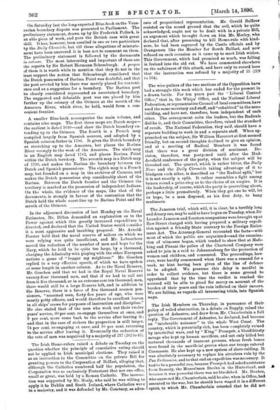In the adjourned discussion of last Monday on the Naval
Estimates, Mr. Dillon demanded an explanation as to the Power against which this greatly increased expenditure is directed, and declared that the United States would consider it a most aggressive and insulting proposal. Mr. Arnold- Forster held that the naval reserve of sailors on which we were relying was quite insufficient, and Mr. Labouchere moved the reduction of the number of men and boys for the Navy, which he held to be quite too large, by a thousand, charging the Admiralty with playing with the other European nations a game of "beggar my neighbour." Mr. Goschen replied in a very effective speech, of which we have spoken at some length in another column. As to the Naval Reserve, Mr. Goschen said that we had in the Royal Naval Reserve twenty-four thousand men, and that if we had to call out from it five thousand, or in an extreme case ten thousand, men, there would still be a large Reserve left, and in addition to the Reserve, there is a force of five thousand seamen pen- sioners, "seasoned men, forty.five years of age, who were mostly petty officers, and would therefore be excellent leaven in all ships' crews for purposes of instruction and discipline." He also stated that of the men who work out their twelve years' service, 60 per cent, re-engage themselves at once, and 9 per cent. more come back to the service after leaving it ; and that in the case of stokers the proportion is still larger, 74 per cent. re-engaging at once, and 10 per cent. returning to the service after leaving it. Eventually the reduction of the vote of men was negatived by a majority of 217 (262 to 45).






































 Previous page
Previous page